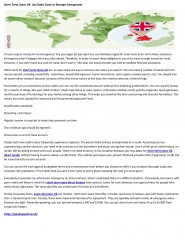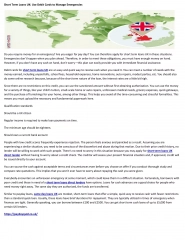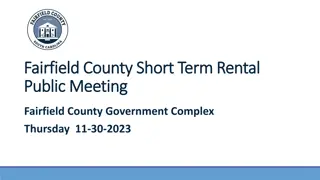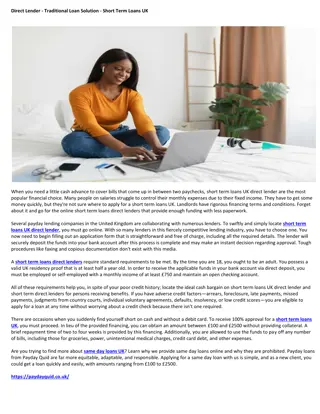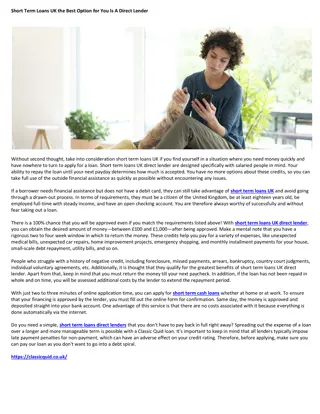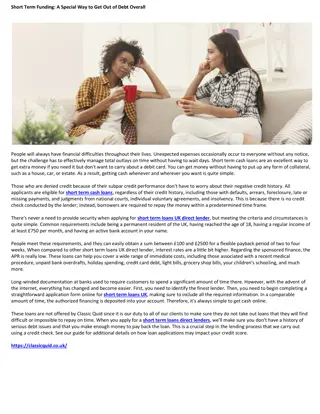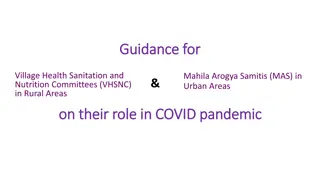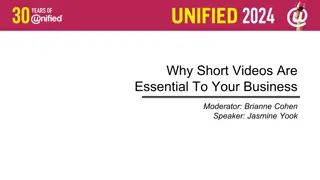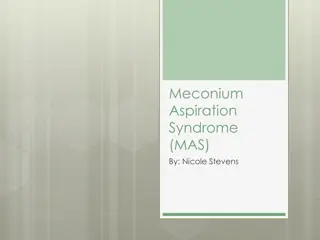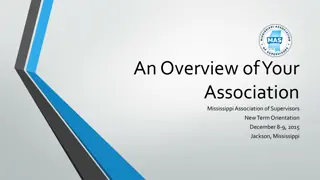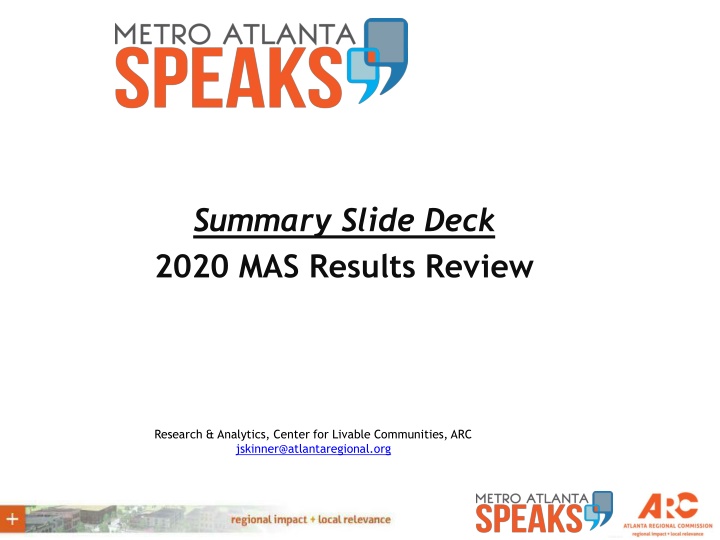
2020 MAS Results Review: Insights from Metro Atlanta Research & Analytics
Delve into the findings of the 2020 MAS Results Review by the Center for Livable Communities at ARC. Explore the genesis, goals, achievements, methodology, survey evolution, and impactful highlights. Discover how COVID-19 reshaped perceptions across public health, crime, economy, race relations, and transportation. Uncover the unveiling of societal inequities and the call for nuanced management in addressing pressing issues.
Download Presentation

Please find below an Image/Link to download the presentation.
The content on the website is provided AS IS for your information and personal use only. It may not be sold, licensed, or shared on other websites without obtaining consent from the author. If you encounter any issues during the download, it is possible that the publisher has removed the file from their server.
You are allowed to download the files provided on this website for personal or commercial use, subject to the condition that they are used lawfully. All files are the property of their respective owners.
The content on the website is provided AS IS for your information and personal use only. It may not be sold, licensed, or shared on other websites without obtaining consent from the author.
E N D
Presentation Transcript
Summary Slide Deck 2020 MAS Results Review Research & Analytics, Center for Livable Communities, ARC jskinner@atlantaregional.org
Genesis, Goals, Achievements 2013 LINK Trip to Houston Led to Effort to Build on Kinder Institute Model (Rice University) Goals for MAS: Assess Perceptions, Define Priorities, Gauge Opinions Stable core of questions with relevant timely topics Demographic Crosstabs Critical Now in Eighth Year (2013 incept)
Genesis, Goals, Achievements Method 2013-2019: Random digit dial (RDD) sample survey of residents in the Atlanta Region 5,200 surveyed in 2019 New 2020 Method: Mixed-Mode RDD of 2,500 respondents Online panel of 1,900 Overriding Focus = Pandemic
Metro Atlanta Speaks-The Skinny 2013: 1 Area (10 co Region) Only, 2.1K surveyed, 21 Q 2014: 11 Areas (10 co+ Reg), 4.2K surveyed, 25 Q 2015: 14 Areas (13 co+ Reg), 5.2K surveyed, 26 Q 2016: 15 Areas (13 co+ Reg+ COA), 5.41K surveyed, 27 Q 2017: 15 Areas (13 co+ Reg+ COA), 5.46K surveyed, 27 Q 2018: 15 Areas (13 co+ Reg+ COA), 5.45K surveyed, 27 Q 2019: 15 Areas (13 co+ Reg+ COA), 5.45K surveyed, 27 Q 2017 to 2019: +-1.3@ MOE Region; 4-7% @ Subregion 2020: 11 Areas (10 co+ Reg), 4.4K surveyed, 18 Q +-1.5@ MOE Region; 3.5-5% @ Subregion Different questions in different topics each year
Survey Sponsor 2020
Milestones: 2020 Survey Consultant Formally Engaged June Questions Finalized in early July Survey Conducted late July to late August Results Delivered during September Ongoing: Roundtables & Sponsor Webinars In Development/ Embargoed: County Press Releases, Updated Website
2020 Highlights COVID-19 Impacted Our World, Greatly A Major Impact on 2 of 3 of Us It Changed How We Assessed Our Biggest Problem/ Challenges Public Health to 1st Crime at second, though down (in share) from last year The Economy, up from 7% in 2019 to 15% this year Race Relations to 4th, up from 4% last year to 12% Transportation falls to 5th place (from the top) It Changed Our Employment/ Economic Stability and Health Situation(s) Almost all pre-pandemic workers had COVID-19 disintegrate, or greatly alter, their work life More stress on dealing with the basics and with financial emergencies Concern with Health (obviously) increased, and Delay in Health Care pervasive It Laid Bare Inequities in our Society We DO perceive discrimination...some more than others EVERYONE needs education about the extent of the gaps We perceive, to some degree, a need for nuanced management of societal ills But We Still Have Hope for the Future A slight increase in those seeing things as getting better in the next 3-4 years
Extent of COVID Impact: 2020 1.9% 7.3% 24.0% Major impact Minor impact No impact at all DK 66.8%
Extent of COVID Impact by County: 2020 100.0% 90.0% 80.0% 57.4% 70.0% 60.4% 62.7% 63.3% 64.4% 65.5% 69.2% 69.7% 69.9% 71.9% 72.2% Major impact 60.0% Minor impact 50.0% No impact at all DK 40.0% 30.0% 34.2% 30.1% 27.4% 26.9% 23.8% 26.1% 19.3% 18.6% 20.0% 20.6% 21.1% 21.6% 10.0% 8.9% 9.5% 6.4% 7.8% 10.3% 8.2% 6.0% 9.2% 8.8% 5.8% 4.5% 0.0% Henry DeKalb Fulton City of Atlanta Clayton Fayette Gwinnett Douglas Cobb Rockdale Cherokee
Know Anyone That Has/ Had COVID-19?: 2020 1.8% 39.9% Yes No DK 58.4%
Know Anyone That Has/ Had COVID-19? By Race/ Eth: 2020 Yes No DK 66.7% 32.5% LATINO* 0.8% 60.5% 37.1% OTHER 2.4% 60.4% 37.9% BLACK 1.7% 55.9% 43.3% WHITE 0.8% * Latinx may be of any race
The Biggest Problem?: The Change from 2019 to 2020 28% Transportation 10% 18% Crime 16% Public Education 10% 8% 9% Human Services 8% 7% Economy 15% 2019 2020 5% Other 5% 7% Public Health 17% 8% Taxes 5% 4% DK 5% 4% Race Relations 12% 0% 5% 10% 15% 20% 25% 30%
The Biggest Problem?: Other Angles Shares Race Relations DK Taxes Public Health Other Economy Human Services Public Education Crime Transportation 2013 2.2% 3.7% 5.6% 4.3% 5.9% 24.4% 2.5% 12.7% 17.4% 21.4% 2014 3.0% 4.0% 6.0% 4.0% 4.0% 20.0% 7.0% 14.0% 14.0% 24.0% 2015 4.9% 3.7% 4.9% 4.5% 1.7% 15.1% 7.3% 14.0% 17.2% 26.7% 2016 6.2% 2.2% 4.2% 4.6% 2.6% 12.3% 8.5% 12.0% 22.8% 24.5% 2017 4.6% 4.9% 4.9% 5.4% 6.2% 9.2% 9.3% 11.5% 16.9% 27.2% 2018 4.9% 3.3% 5.8% 5.4% 7.9% 6.0% 7.2% 9.4% 21.9% 28.2% 2019 4.0% 4.0% 8.0% 7.0% 5.0% 7.0% 9.0% 10.0% 18.0% 28.2% 2020 11.8% 5.2% 4.9% 16.7% 5.1% 14.8% 7.5% 7.5% 16.3% 10.4% Rank Race Relations DK Taxes Public Health Other Economy Human Services Public Education Crime Transportation 2013 2014 2015 2016 2017 2018 2019 2020 10 8 6 7 5 1 9 4 3 2 10 7 6 7 7 2 5 3 3 1 6 9 6 8 6 10 8 8 7 6 5 4 3 2 1 9 9 9 5 6 8 6 4 3 2 1 4 8 10 8 7 9 3 5 4 2 1 10 7 8 4 6 5 3 2 1 10 1 9 3 6 6 2 5 10 3 5 4 2 1 Pct Point Change 2013-2014 2014-2015 2015-2016 2016-2017 2017-2018 2018-2019 2019-2020 Race Relations 0.8 1.9 DK 0.3 -0.3 -1.5 Taxes 0.4 -1.1 -0.7 Public Health -0.3 0.5 Other -1.9 -2.3 Economy -4.4 -4.9 -2.8 Human Services 4.5 0.3 Public Education 1.3 0.0 -2.0 Crime -3.4 3.2 Transportation 2.6 2.7 -2.2 1.3 -1.6 2.7 0.7 0.8 3.6 -3.1 0.8 -0.5 -5.9 2.7 0.3 -1.6 0.9 0.0 1.7 -3.2 -2.1 -2.1 5.0 1.0 -0.9 0.7 2.2 1.6 -2.9 1.0 1.8 0.6 -3.9 0.0 7.8 1.2 -3.1 9.7 0.1 7.8 -1.5 -2.5 -1.7 -17.8 Increases Declines 0.1 0.9 1.2 5.6
The Biggest Problem?: 2020 by County 17.0% 19.8% Rockdale 19.5% 12.8% 4.8% 13.0% 19.0% Fayette 15.5% 15.0% 9.8% 12.3% 18.3% Gwinnett 15.0% 14.8% 10.8% 12.7% 18.2% Cherokee 17.5% 14.7% 10.5% 10.7% 17.7% Cobb 16.9% 15.2% 12.2% 8.6% 17.0% City of Atlanta 15.1% 14.8% 9.2% 11.8% 16.7% ARC 10 16.3% 14.8% 10.4% 9.8% 16.5% Fulton 13.0% 15.1% 10.0% 10.9% 15.5% DeKalb 19.6% 12.5% 11.5% 13.2% 14.5% Clayton 19.7% 20.4% 7.0% 14.2% 13.7% Douglas 15.2% 17.5% 8.2% 19.3% 11.8% Henry 17.3% 11.8% 10.0% 0% 10% 20% 30% 40% 50% 60% 70% 80% 90% 100% Public Health Crime Economy Race Relations Transportation Public Education Human Services DK Other Taxes
The Biggest Problem?: 2020 by Age Group 25.0% 18-34 35-49 50-64 65+ Overall 21.6% 20.0% 19.4% 16.7% 16.3% 16.2% 14.8% 15.0% 14.2% 11.8% 11.7% 10.4% 10.3% 10.1% 10.0% 7.9% 7.5% 7.5% 5.9% 5.5% 5.2% 5.1% 4.9% 5.0% 0.0% Transportation Race Relations Economy Crime Public Health Public Education Human Services Taxes Other DK
The Biggest Problem?: 2020 by Race/ Ethnicity Black White Other Latino* Overall 25.0% 19.6% 20.0% 16.8% 16.7% 16.7% 16.3% 15.7% 14.8% 15.0% 13.5% 13.0% 12.5% 11.8% 10.4% 9.8% 10.0% 7. 7.5% 7.2% 5.7% 5.4% 4.9% 5.2% 5.1% 5.0% 0.0% Transportation Race Relations Economy Crime Public Health Public Education Human Services Taxes Other DK
Question: For Pre-Pandemic Workers Please tell us if you were affected by the COVID-19 pandemic in any of the following ways . (Interviewer: Read each item separately and check if R says yes ) 1. Laid off, terminated or furloughed from your job 2. Remained employed but with reduced hours 3. Remained employed, but forced to take a cut in wages/hourly pay 4. Allowed to work from home/telecommute 5. Quit job / resigned for personal safety 6. None of the above
Share of Pre-Pandemic Workers with One or More Changes in Status By Area: 2020 City of Atlanta 86.0% Clayton 85.8% DeKalb 85.6% Fulton 84.2% Cobb 82.8% Gwinnett 82.7% ARC 10 82.4% Fayette 82.1% Rockdale 81.2% Henry 77.4% Cherokee 74.3% Douglas 64.0% 0.0% 10.0% 20.0% 30.0% 40.0% 50.0% 60.0% 70.0% 80.0% 90.0% 100.0%
Pre-Pandemic Employed Experiencing Layoffs By Area: 2020 29.2% Clayton 28.7% DeKalb 28.2% City of Atlanta 26.7% Fulton 25.3% Rockdale 24.6% Gwinnett 24.4% Fayette 23.8% ARC 10 23.0% Henry 22.5% Cherokee 19.5% Douglas 12.7% Cobb * % of 2,900 respondents employed as of the beginning of the pandemic 0.0% 5.0% 10.0% 15.0% 20.0% 25.0% 30.0% 35.0%
Pre-Pandemic Employed Allowed to Work from Home By Area: 2020 * % of 2,900 respondents employed as of the beginning of the pandemic Cobb 43.1% Fulton 39.2% City of Atlanta 37.7% Cherokee 34.1% Fayette 34.0% ARC 10 33.1% DeKalb 31.6% Rockdale 29.5% Gwinnett 26.8% Henry 26.4% Douglas 24.3% Clayton 18.8% 0.0% 5.0% 10.0% 15.0% 20.0% 25.0% 30.0% 35.0% 40.0% 45.0% 50.0%
Pre-Pandemic Employed Changes in Pandemic by Race: 2020 17.5% Latino* None of the above 20.6% 12.8% Other 12.7% White Quit job for safety reasons 5.0% 6.6% Black 17.5% Worked from home 38.0% 29.1% 15.9% Remained Employed - Cut in wages/ hourly pay 11.4% 15.3% 31.0% Remained Employed -Reduced hours 22.5% 28.3% 26.2% Laid off, terminated or furloughed 19.1% 29.0% 0.0% 5.0% 10.0% 15.0% 20.0% 25.0% 30.0% 35.0% 40.0%
Confidence in Ability to Pay Next Mortgage or Rent PaymentBy Area: 2020 Clayton 44.1% 46.1% 9.7% City of Atlanta 42.3% 46.2% 11.5% DeKalb 38.8% 47.8% 13.4% Fulton 34.9% 50.8% 14.3% Henry 33.3% 56.9% 9.8% Rockdale 33.3% 58.5% 8.3% ARC 10 31.7% 54.4% 13.9% Douglas 30.8% 60.2% 9.0% Gwinnett 29.8% 57.6% 12.5% Cherokee 23.9% 62.6% 13.5% Fayette 23.8% 65.9% 10.3% Cobb 20.9% 58.7% 20.4% 0.0% 10.0% 20.0% 30.0% 40.0% 50.0% 60.0% 70.0% 80.0% 90.0% 100.0% Less than Very Confident Very confident Other*
Confidence in Ability to Pay Mortgage or RentBy Race/ Ethnicity: 2020 Latino* 42.3% 48.9% 8.8% Other 44.5% 47.7% 7.8% White 21.3% 60.9% 17.8% Black 41.6% 48.4% 10.0% 0.0% 10.0% 20.0% 30.0% 40.0% 50.0% 60.0% 70.0% 80.0% 90.0% 100.0% Less than Very Confident Very confident Other*
Confidence in Ability to Pay Mortgage or RentBy Age Group: 2020 Less than Very Confident Very confident Other* 100.0% 10.6% 11.1% 11.6% 90.0% 28.3% 80.0% 70.0% 48.6% 52.5% 60.0% 63.3% 50.0% 56.3% 40.0% 30.0% 40.3% 20.0% 36.9% 25.0% 10.0% 15.4% 0.0% 18-34 35-49 50-64 65+
Question: For All Respondents Since March of this year, have you received food from an organization such as a church or a food bank to help feed you and your family? 1. Yes 2. No 3. DK
Received Food from a Food Bank Since March: By Area(s) 2020 City of Atlanta 31.7% 65.9% Clayton 26.1% 72.4% DeKalb 25.0% 74.2% Rockdale 23.5% 74.3% Fulton 21.3% 77.2% ARC 10 17.9% 80.8% Douglas 17.0% 82.5% Henry 15.5% 82.8% Cobb 14.0% 85.0% Gwinnett 12.5% 86.7% Cherokee 8.5% 88.3% Fayette 7.5% 91.3% 0.0% 10.0% 20.0% 30.0% 40.0% Yes 50.0% No 60.0% 70.0% 80.0% 90.0% 100.0% DK
Received Food from a Food Bank Since March: By Race/ Ethnicity, 2020 Yes No DK White 12.2% 87.4% Other 17.9% 81.5% Black 25.6% 72.9% Latino* 28.6% 71.2% 0% 10% 20% 30% 40% 50% 60% 70% 80% 90% 100%
Received Food from a Food Bank Since March: By Age Group, 2020 100% 90% 80% 70% 78.2% 60% 74.1% DK 87.8% 89.7% 50% No 40% Yes 30% 20% 23.3% 21.4% 10% 11.4% 10.3% 0% 18-34 35-49 50-64 65+
Question: For All Respondents Some people have a hard time dealing with financial emergencies, while others are better able to handle these situations . We d like to get a feel for how people would deal with an unexpected financial emergency. Suppose you had to come up with $400 for such an emergency. Which of the following best describes how you would handle such a situation? 1. You would pay for it with cash, check or debit card 2. You would put it on a credit card 3. You would borrow money from someone 4. You would sell or pawn something to get the money, or 5. You would not be able to get the money right now? 6. DK/NA
Could Pay for a $400 Emergency with By Area: 2020 Fayette 58.9% 41.1% Henry 56.0% 44.0% Cherokee 52.9% 47.1% Gwinnett 52.8% 47.3% DeKalb 52.5% 47.5% ARC 10 50.0% 50.0% Douglas 49.9% 50.1% Cobb 49.4% 50.6% Fulton 45.9% 54.1% City of Atlanta 44.1% 55.9% Rockdale 43.0% 57.0% Clayton 41.0% 59.0% 0% 10% 20% 30% 40% 50% 60% 70% 80% 90% 100% Cash, Check, Debit Other Options
Could Pay for a $400 Emergency withby Race/Ethnicity: 2020 60.0% 60.0% 57.5% 56.6% 55.6% 50.0% 44.4% 43.4% 42.5% 40.0% 40.0% 30.0% 20.0% 10.0% 0.0% White Black Other Latino* Cash, Check, Debit Other Options
Could Pay for a $400 Emergency withby Age Group: 2020 100% 90% 39.9% 80% 45.4% 53.8% 56.3% 70% 60% 50% 40% 60.1% 30% 54.6% 46.2% 43.7% 20% 10% 0% 18-34 35-49 50-64 65+ Cash, Check, Debit Other Options
Could Pay for a $400 Emergency withby Race/Ethnicity: 2020 60.0% 60.0% 57.5% 56.6% 55.6% 50.0% 44.4% 43.4% 42.5% 40.0% 40.0% 30.0% 20.0% 10.0% 0.0% White Black Other Latino* Cash, Check, Debit Other Options
Question: For All Respondents We d like to get your opinions on some issues related to the COVID-19 pandemic that have been experiencing for several months now When considering your own wellbeing, has COVID-19 been a greater threat to <the first two response items will be randomly ordered for each respondent> 1.Your health 2.Your finances 3.Both your health and finances, or 4.Neither? 5.(Respondent offers) DK/NA
Area(s) Most Impacted by COVID-19: 2020 Both health and finances 29.8% Health 21.5% Finances 19.8% Neither 26.5% DK 2.4% 0.0% 5.0% 10.0% 15.0% 20.0% 25.0% 30.0% 35.0%
Area(s) Most Impacted by COVID-19, by Age Group: 2020 65+ 30.0% 19.9% 41.1% 6.4% 50-64 22.9% 26.4% 29.5% 20.0% 35-49 19.8% 34.1% 21.9% 21.4% 18-34 18.1% 34.3% 19.9% 25.3% 0.0% 10.0% 20.0% 30.0% 40.0% 50.0% 60.0% 70.0% 80.0% 90.0% 100.0% Health Finances Both health and finances Neither DK
Delay of Medical Care? By Region & County: 2020 DeKalb 46.6% 49.2% 4.1% Henry 45.8% 50.0% 4.3% Cobb 44.6% 53.1% 2.2% City of Atlanta 44.3% 53.9% 1.7% Fayette 43.8% 55.8% 0.5% Clayton 43.3% 52.8% 4.0% ARC 10 41.1% 55.4% 3.5% Rockdale 40.4% 57.6% 2.0% Fulton 40.3% 56.3% 3.4% Douglas 39.0% 59.8% 1.3% Gwinnett 35.3% 60.5% 4.3% Cherokee 31.3% 63.4% 5.2% 0.0% 20.0% 40.0% 60.0% 80.0% 100.0% 120.0% Yes No DK
Discrimination against Black People is a Serious Problem by Area(s): 2020 City of Atlanta 63.7% 25.8% 5.1% 3.7% DeKalb 60.8% 26.7% 5.3% 4.0% Clayton 64.0% 19.8% 6.3% 7.3% Fulton 55.4% 27.7% 8.8% 5.7% ARC 10 49.6% 27.2% 12.3% 7.2% Douglas 49.8% 26.8% 12.8% 9.3% Gwinnett 41.6% 31.1% 16.3% 6.8% Rockdale 46.3% 26.3% 17.8% 8.3% Cobb 45.4% 25.7% 14.7% 9.0% Henry 44.5% 22.5% 16.3% 12.0% Fayette 34.9% 29.2% 18.7% 11.0% Cherokee 27.9% 29.9% 24.9% 13.0% 0.0% 20.0% 40.0% 60.0% 80.0% 100.0% 120.0% Strongly Agree Agree Disagree Strongly Disagree DK
Discrimination against Black People is a Serious Problem by Age Group: 2020 18-34 64.6% 25.5% 4.4% 3.8% 35-49 53.1% 23.5% 12.7% 5.2% 50-64 39.3% 29.8% 16.2% 11.4% 65+ 32.1% 32.1% 20.8% 10.3% 0.0% 10.0% 20.0% 30.0% 40.0% 50.0% 60.0% 70.0% 80.0% 90.0% 100.0% Strongly Agree Agree Disagree Strongly Disagree DK
Discrimination against Black People is a Serious Problem by Race/ Ethnicity: 2020 Black 73.0% 20.0% 2.5% 2.5% 2.0% Latino 50.1% 32.5% 12.3% 4.9% Other 45.4% 31.2% 13.7% 2.4% 7.4% White 32.9% 32.5% 19.3% 4.2% 11.1% 0% 10% 20% 30% 40% 50% 60% 70% 80% 90% 100% Strongly Agree Agree Disagree Strongly Disagree DK
Question: For All Respondents If a typical white family in the United States has 100 units of overall wealth, how many units of overall wealth does the typical Black family have? (INTERVIEWER: Code number of units 0 100. DK/NA = 999)
Ratio of Black Wealth to White Wealth by Area: 2020 70 65 60 58 56 55 53 51 51 51 50 48 46 44 41 40 30 20 10 10 0 Clayton DeKalb City of Atlanta Fulton Rockdale Gwinnett Douglas Henry Fayette Cobb Cherokee ARC 10 ACTUAL
How Should Police Best Be Utilized?: by Area: 2020 100.0% 2.8% 3.0% 3.1% 3.3% 4.5% 4.8% 4.8% 5.0% 5.5% 6.5% 7.0% 7.3% 90.0% 25.7% 80.0% 38.8% 40.3% 35.5% 39.7% 36.1% 41.5% 43.5% 44.0% 49.6% 48.4% 70.0% 56.4% 60.0% 50.0% 40.0% 67.8% 30.0% 58.5% 57.5% 56.6% 56.5% 55.4% 53.0% 51.8% 51.2% 47.3% 47.1% 40.6% 20.0% 10.0% 0.0% DeKalb Fulton City of Atlanta ARC10 Clayton Gwinnett Cobb Douglas Fayette Henry Rockdale Cherokee Respond to all calls Leave non-violent calls to other agencies DK
How Should Police Best Be Utilized?: by Age Group: 2020 Respond to all calls Leave non-violent calls to other agencies DK 70.0% 66.0% 59.6% 60.0% 57.2% 50.5% 50.0% 45.9% 40.0% 37.2% 35.6% 28.7% 30.0% 20.0% 10.0% 5.6% 5.3% 4.8% 3.7% 0.0% 18-34 35-49 50-64 65+
How Should Police Best Be Utilized?: by Race/ Ethnicity: 2020 White 57.6% 37.9% 4.5% Other 44.5% 49.4% 6.1% Black 45.5% 50.7% 3.9% Latino 39.7% 57.9% 2.5% 0% 10% 20% 30% 40% 50% 60% 70% 80% 90% 100% Respond to all calls Leave non-violent calls to other agencies DK
Looking Ahead 3-4 Years 2020 City of Atlanta 41.1% 25.2% 29.8% 3.8% Fulton 39.7% 23.0% 31.3% 6.0% Cobb 32.7% 27.4% 33.2% 6.7% ARC 10 32.2% 26.3% 33.9% 7.6% Clayton 31.1% 23.3% 35.1% 10.5% Cherokee 30.7% 27.2% 31.4% 10.7% Fayette 30.3% 21.1% 37.8% 10.8% Douglas 29.9% 28.9% 34.2% 7.0% Rockdale 29.8% 28.6% 31.3% 10.3% Gwinnett 29.8% 26.0% 37.8% 6.5% DeKalb 27.9% 28.6% 34.8% 8.7% Henry 25.6% 34.3% 30.3% 9.8% 0% 10% 20% 30% 40% 50% 60% 70% 80% 90% 100% Better in 3-4 years Worse in 3-4 years About the same DK
Looking Ahead 3-4 Years (By Race)2020 Latino 40.1% 22.7% 32.3% 4.9% Black 36.0% 27.0% 30.6% 6.4% Other 32.0% 27.3% 33.3% 7.4% White 30.2% 24.9% 37.7% 7.3% 0% 10% 20% 30% 40% 50% 60% 70% 80% 90% 100% Better in 3-4 years Worse in 3-4 years About the same DK


